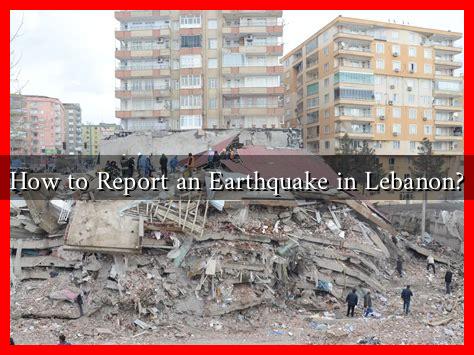-
Table of Contents
How to Report an Earthquake in Lebanon?
Lebanon is situated in a seismically active region, making it susceptible to earthquakes. Understanding how to report an earthquake is crucial for public safety and effective disaster response.
. This article will guide you through the steps to report an earthquake in Lebanon, the importance of timely reporting, and the resources available for citizens.
Understanding Earthquake Reporting
Earthquake reporting involves notifying relevant authorities and organizations about seismic events. This process is vital for several reasons:
- Public Safety: Timely reports can help authorities issue warnings and prepare emergency services.
- Data Collection: Accurate reporting contributes to the scientific understanding of seismic activity.
- Community Awareness: Sharing information can help educate the public about earthquake preparedness.
Steps to Report an Earthquake in Lebanon
Reporting an earthquake in Lebanon involves a few straightforward steps. Here’s how you can do it:
1. Assess the Situation
Before reporting, ensure your safety and the safety of those around you. Check for injuries and assess any damage. If you are in a safe location, proceed to report the earthquake.
2. Gather Information
Collect as much information as possible about the earthquake:
- Time: Note the exact time the earthquake occurred.
- Location: Identify your location and the epicenter if known.
- Magnitude: If possible, determine the magnitude of the earthquake.
- Impact: Document any damages or injuries.
3. Contact Relevant Authorities
In Lebanon, you can report an earthquake to the following organizations:
- National Center for Geophysics: This center monitors seismic activity and can be reached at www.geophysics.gov.lb.
- Civil Defense: For immediate assistance and to report emergencies, contact the Civil Defense at 125.
- Local Authorities: Inform your local municipality or police station about the earthquake.
Utilizing Technology for Reporting
In today’s digital age, technology plays a significant role in reporting earthquakes. Here are some tools and platforms you can use:
- Mobile Apps: Apps like “My Earthquake Alerts” provide real-time notifications and allow users to report seismic events.
- Social Media: Platforms like Twitter and Facebook can be used to share information quickly with a broader audience.
- Online Forms: The National Center for Geophysics has online forms for reporting seismic activity.
Case Studies and Statistics
Lebanon has experienced several significant earthquakes in its history. For instance, the 1999 earthquake in the region of Qana had a magnitude of 5.8 and caused considerable damage. According to the Lebanese National Center for Geophysics, Lebanon experiences an average of 20-30 minor earthquakes annually, with only a few reaching significant magnitudes.
Understanding these statistics emphasizes the importance of being prepared and knowing how to report seismic events effectively.
Conclusion
Reporting an earthquake in Lebanon is a critical process that can save lives and aid in disaster response. By assessing the situation, gathering information, and contacting the appropriate authorities, citizens can contribute to public safety and scientific understanding. Utilizing technology further enhances the reporting process, making it easier to share vital information quickly. As Lebanon continues to face seismic challenges, being informed and prepared is essential for all residents.
For more information on earthquake preparedness and reporting, visit the National Center for Geophysics.





